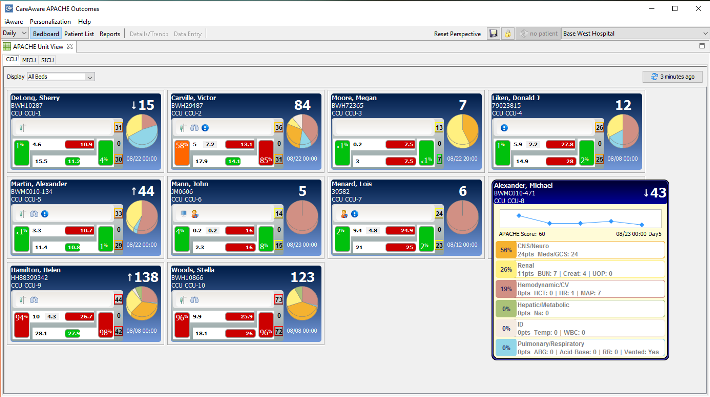|
|
|
Intensive Care Units are under increasing pressures to minimize costs while maintaining strict quality standards. This makes effective measurement and reporting of outcomes essential. Oracle Health's APACHE Outcomes is the ideal solution for measuring and improving ICU patient outcomes.
|
|
APACHE Outcomes allows the clinician to objectively evaluate the quality of care delivered in an ICU setting. With a focus on process improvement and resource optimization, APACHE provides access to the one of the largest outcomes databases in the world, containing over half a million contemporary admissions, with the greatest depth of benchmarking capabilities. APACHE is the acknowledged leader among ICU severity scoring systems and referenced in more than 4,000 peer reviewed critical care publications.
Risk-adjusted predictions
APACHE Outcomes delivers clinicians a concurrent decision support, and performance management system that includes risk-adjusted outcome measures, robust built-in and ad hoc reporting capabilities, and comparative reporting across the client base.
|
 |
|
It features the most current risk-adjusted outcome measures in the industry, coupled with well-defined clinical content and reporting capabilities to help improve critical care outcomes.
Quality and utilization indicators that can be used to compare your performance to national, similar, and/or best practice norms include:
- ICU and Hospital Mortality
- ICU and Hospital Length of Stay
- Duration of Mechanical Ventilation
- Active Treatment Rate
- Low Risk Monitor Admission Rate
- Therapeutic Intervention Scoring System (TISS)
|
|
Unit View
The Unit View within APACHE Outcomes presents pertinent information for evaluating patients' severity of illness at-a-glance. Having risk-adjusted patient information available in one location for quick viewing can save valuable time for clinicians.
Enhanced decision making
APACHE Outcomes provides numeric indicators of severity of illness, mortality risk, active treatment risk, and expected ICU and hospital length of stay. Clinicians can use the severity of illness score to prioritize for rounds and patient care, or Identify patients that are ready to move to a lower level of care or be discharged.It also provides clinicians disease specific risk-adjusted predictions, trends a patient's response to therapy, and even identifies potentially inappropriate admissions.
|
 |
|
|
|
Reporting and analytics
Comprehensive reporting and analytic capabilities help drive process improvement activities and improve patient outcomes.
- Pre-built, standard reports focused on outcomes, resource utilization, and clinical content
- Filter/ drill-down capabilities into aggregate data on both standard and comparative reports
- The ability to generate ad hoc/custom reports at the unit and individual patient level
By leveraging the robust APACHE Outcomes database, these reports enable you to compare your ICU's performance against national benchmarks as well as against that of similar institutions.
Take your data analysis to the next level by utilizing the iCompare data set:
- Receive quarterly comparative reports for benchmarking ICU performance across the current client-base
- Access additional clinical content for analysis and performance improvement
|
|
|
|
Enhance your existing EHR
Because APACHE Outcomes was designed to be EHR agnostic, it can be utilized with any EHR. This means you can leverage your existing EHR investment while still gaining the benefits of the most robust outcomes management solution available.
|
|